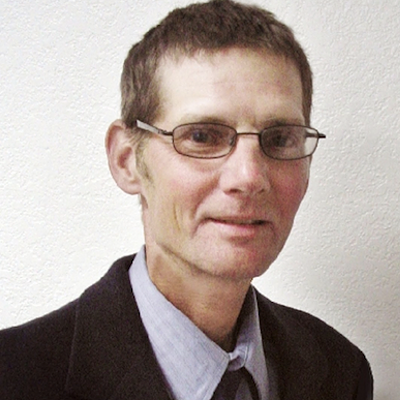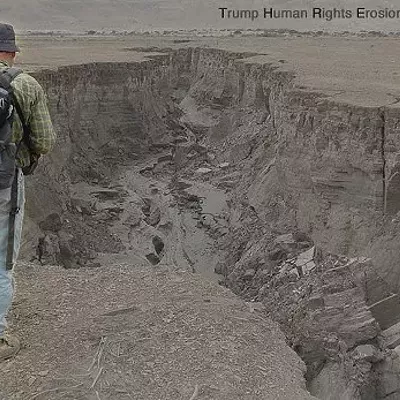Ephraim Cruz has felt the business end of that disorder firsthand. On Nov. 9, he was forced to resign as a senior agent, ending nine years of what he hoped would be a career. Those hopes came before he started pointing out the routine abuse of detainees at the agency's facility in Douglas.
Soon, he found himself indicted on trumped-up charges of knowingly transporting an illegal alien into the United States, among other crimes. In March, a federal jury acquitted Cruz on all counts.
He felt elated the day he strode victoriously from the courtroom. Then the other shoe dropped, in the form of a thick packet from the Border Patrol, demanding that he resign or be terminated. "They accused me of lying under oath," he says, "and of conduct unbecoming an officer, for smuggling an alien into the country. If those things were true, I would never had made it out of the courthouse door."
But he says he knows full well why the Border Patrol wanted to expel him any way it could: Between getting charged and getting acquitted, he'd learned how to focus attention on deficiencies within the agency. "Clearly, they were intent upon removing me, because I was intent on ensuring that their detention policies at some point matched the practices they actually used."
Cruz was first targeted in 2004, when he complained in a memo to superiors that detainees were being routinely and systematically mistreated at the Douglas station. At first, he was ignored. Then he suddenly began receiving bad performance reviews and was eventually assigned to demeaning library duty. In July 2005, he was brought up on the criminal counts.
He believes the Border Patrol thought that would be the end of it. But when he beat the charges, the agency resorted to Plan B. That's when Cruz received his walking papers.
Now drained of funds, he couldn't afford a lawyer to fight back.
This pattern is all too common, says one longtime observer of the Border Patrol, speaking off the record. The observer says that the agency typically tries to break troublemakers, both financially and emotionally, until they finally give up.
Border Patrol spokeswoman Andrea Zortman, based in Washington, D.C., was contacted in mid-November for comment on the forced resignation of Cruz. As with all matters surrounding this case, weeks later, she's still "pursuing other avenues" to find information.
Robert Lee Maril sees the harassment of agents like Ephraim Cruz as symptomatic of a much deeper malaise. Maril is the Sociology Department chair at East Carolina University, and author of Patrolling Chaos: The U.S. Border Patrol in Deep South Texas. The book chronicles two years he spent observing the Border Patrol in McAllen, Texas.
He says the treatment of Cruz is similar to what occurred at the McAllen Station. "They attempt to marginalize agents who are seen at all as rocking the boat, questioning the system or otherwise drawing attention to the Border Patrol. If they can't get you in terms of the law--or policy as the agent follows it--then they're likely to try to marginalize you in other ways."
According to Cruz, that very message came from former Tucson Sector chiefs Michael Nicley, who retired in March, and David Aguilar, who now heads the agency in Washington, D.C.
"David Aguilar has been running the type of operation where you reward your 'yes' men, and you have them retaliate against your rebellious agents," Cruz says. "Time and again, Chief Aguilar and even Chief Nicley have said they wouldn't tolerate any agents tarnishing the badge of the Border Patrol. And that includes agents who record wrongdoing internally."
Maril says that stance is part of Border Patrol culture. "Historically, they have never liked any kind of direct feedback from the agents themselves. It's all top-down policy decision-making, even though what the agents have to say is worthy of notice, and might even (highlight) important problems in the system.
"What's most unfortunate," he says, "is that the agents in many ways can make the kinds of low-level decisions that will make their job better for them and more beneficial (to the agency). But when they're not having any input, it's just like an auto worker on the assembly line. The worker might know how to do something better. But when management doesn't listen to him, the product isn't as good. Unfortunately, that's what I've seen over and over with the Border Patrol."
And that's no way to run an agency, Maril says. "This is typical of what I would call a dysfunctional organization--it demonstrates poor management practices in general."
Not surprisingly, fallout from those practices ripple down through the ranks. Even as it struggles to add thousands of new agents, the Border Patrol wrestles with low morale and annual attrition rates hovering around 5 percent.
When the Department of Homeland Security was created in 2003, it absorbed the Border Patrol. But in a recent Federal Human Capital Survey, the Border Patrol polled worst among DHS employees for management, leadership and job satisfaction.
These days, however, Border Patrol officials have one less agent to kick around--or to rock the boat. Still, Cruz worries about the organization where he spent nearly a decade of his life.
"The message is, 'Toe the line, or else,'" he says. "And at the very minimum, that's created an agency filled with agents who will look the other way" when policy violations occur.
"The agents may not agree with it. But then you have an example like me--reporting wrongdoing, and today, I'm on the outside looking in. Who wouldn't just look the other way?"









